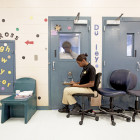
Advocates Still Hopeful for Action on Stalled JJDPA Reauthorization
|
Juvenile justice reformers still hope to see action this year on key legislation that stalled in the Senate several months ago.
Juvenile Justice Information Exchange (https://jjie.org/author/sarahbarr/page/5/)

Juvenile justice reformers still hope to see action this year on key legislation that stalled in the Senate several months ago.

Children with an incarcerated parent often suffer emotionally, academically and financially, and too few policies consider their needs, says a new report from the Annie E. Casey Foundation.

The federal government wants to help states eliminate the use of solitary confinement for juvenile offenders. “Our goal is to eliminate the practice,” said Robert Listenbee, OJJDP administrator.

See our continuing coverage of disenfranchisement here. * * *
Voting in Virginia just got easier for more than 200,000 people with felony records. Under an executive order signed today, all former felons who have completed their full sentences as of today can immediately re-register to vote, the latest move by Gov. Terry McAuliffe, a Democrat, to ease the rights restoration process. “If we are going to build a stronger and more equal Virginia, we must break down barriers to participation in civic life for people who return to society seeking a second chance. We must welcome them back and offer the opportunity to build a better life by taking an active role in our democracy,” McAuliffe said in a news release.

A campaign to end solitary confinement for juveniles launched today, with supporters pledging to build on the momentum of leading-edge jurisdictions that have banned the practice.

On Monday, Kansas became the latest state to overhaul its juvenile justice system, with a set of reforms projected to reduce the number of juveniles in custody by more than half and save tens of millions of dollars.

DeAngelo Cortijo remembers the fear he felt as a young boy on the day his mother was lifted unconscious into an ambulance. He thought he would never see her again.

During the last decade, advocates and policymakers in Connecticut and Illinois won contentious battles to keep young offenders in juvenile court until they turned 18 years old.

Once each month a conference room in an employment center tucked in the corner of an office park becomes a one-stop shop for second chances.

Leandra Phommavongsay began his speech to the dozen or so teenagers gathered in the back of a Clayton County courtroom by recounting his recent travels.